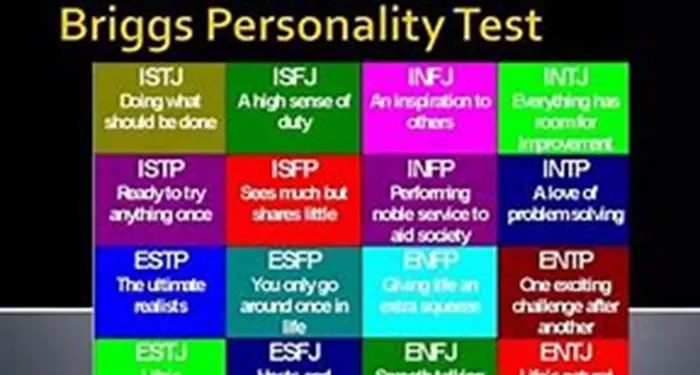The Myers-Briggs Personality Test, often referred to as the MBTI (Myers-Briggs Type Indicator), is one of the most popular personality assessments in the world. It is designed to help individuals understand their personality preferences and how they interact with the world around them. The test is based on the theories of Swiss psychiatrist Carl Jung and was developed by Katharine Cook Briggs and her daughter Isabel Briggs Myers. The MBTI is widely used in various settings, including career counseling, team building, and personal development.
Understanding the MBTI Framework
The MBTI categorizes personalities into 16 distinct types based on four dichotomies:
Extraversion (E) vs. Introversion (I): This dichotomy explores where individuals draw their energy from. Extraverts are energized by social interactions, while Introverts recharge through solitude.
Sensing (S) vs. Intuition (N): This dimension looks at how people gather information. Sensors focus on concrete, present realities, whereas Intuitives are more interested in abstract concepts and future possibilities.
Thinking (T) vs. Feeling (F): This dichotomy examines decision-making processes. Thinkers prioritize logic and objective analysis, while Feelers consider personal values and the impact on others.
Judging (J) vs. Perceiving (P): This dimension assesses how individuals approach the outside world. Judgers prefer structure and planning, whereas Perceivers are more flexible and spontaneous.
Why Take the Myers-Briggs Personality Test?
Taking the MBTI can offer numerous benefits:
- Self-Awareness: Understanding your personality type can provide insights into your strengths, weaknesses, and preferences.
- Improved Relationships: By recognizing different personality types, you can better understand and communicate with others.
- Career Guidance: The MBTI can help identify careers that align with your personality traits.
- Personal Growth: Awareness of your personality can guide you in areas where you want to grow or change.
How to Take the Myers-Briggs Personality Test
Choose a Reliable Source
There are numerous online platforms offering the MBTI test. However, it’s crucial to select a reputable source to ensure the accuracy and reliability of the results. Some well-known platforms include the official Myers-Briggs website, 16Personalities, and Truity.
Set Aside Time
The MBTI test typically takes about 20-30 minutes to complete. Ensure you have a quiet, distraction-free environment to focus on the questions.
Answer Honestly
The test consists of a series of questions designed to gauge your preferences. It’s essential to answer honestly rather than how you think you should answer. There are no right or wrong answers; the goal is to reflect your true self.
Review Your Results
After completing the test, you’ll receive a four-letter personality type (e.g., INFJ, ENTP). Take time to read the detailed description of your type. Most platforms provide comprehensive reports that explain your type’s characteristics, strengths, potential weaknesses, and more.
Reflect and Apply
Understanding your personality type is just the beginning. Reflect on how this knowledge applies to your life. Consider how your type influences your relationships, career choices, and personal development.
Interpreting Your MBTI Results
Understanding Your Four-Letter Type
Each of the 16 personality types has unique traits. Here’s a brief overview:
- ISTJ (The Inspector): Practical, detail-oriented, and dependable.
- ISFJ (The Protector): Warm, caring, and responsible.
- INFJ (The Advocate): Insightful, principled, and determined.
- INTJ (The Architect): Strategic, logical, and independent.
- ISTP (The Virtuoso): Spontaneous, analytical, and pragmatic.
- ISFP (The Adventurer): Gentle, flexible, and artistic.
- INFP (The Mediator): Idealistic, empathetic, and creative.
- INTP (The Thinker): Curious, innovative, and intellectual.
- ESTP (The Dynamo): Energetic, action-oriented, and sociable.
- ESFP (The Performer): Playful, enthusiastic, and spontaneous.
- ENFP (The Campaigner): Charismatic, imaginative, and optimistic.
- ENTP (The Debater): Quick-witted, inventive, and outspoken.
- ESTJ (The Executive): Organized, decisive, and efficient.
- ESFJ (The Consul): Sociable, caring, and orderly.
- ENFJ (The Protagonist): Charismatic, empathetic, and inspiring.
- ENTJ (The Commander): Bold, strategic, and goal-oriented.
Exploring Type Dynamics
Beyond the four-letter type, the MBTI also delves into type dynamics, which explore how the different preferences interact. For example, an INFJ’s dominant function is Introverted Intuition, which influences how they perceive the world, while their auxiliary function is Extraverted Feeling, guiding their decision-making process.
Recognizing Strengths and Weaknesses
Each personality type has inherent strengths and potential weaknesses. For instance, INFJs are known for their empathy and insight but may struggle with perfectionism and overthinking. Recognizing these traits can help you leverage your strengths and address areas for growth.
Applying MBTI Insights in Real Life
In Personal Relationships
Understanding your personality type and that of others can enhance communication and reduce conflicts. For example, knowing that your partner is an Introvert can help you appreciate their need for alone time, while they can understand your need for social interaction if you’re an Extravert.
In the Workplace
The MBTI can be a valuable tool for team building and career development. For instance, an ENTP might thrive in roles that require innovation and problem-solving, while an ISFJ might excel in supportive, detail-oriented positions. Recognizing these preferences can lead to more effective collaboration and job satisfaction.
In Personal Development
Self-awareness is a cornerstone of personal growth. By understanding your personality type, you can set realistic goals, develop coping strategies, and pursue activities that align with your natural tendencies. For example, an INFP might find fulfillment in creative pursuits, while an ESTJ might focus on achieving tangible results.
Common Misconceptions About the MBTI
It’s Not a Definitive Label
While the MBTI provides valuable insights, it’s essential to remember that it’s not a definitive label. Personality is complex and can’t be fully captured by a single test. Use the MBTI as a tool for self-discovery rather than a rigid categorization.
It’s Not a Measure of Intelligence or Ability
The MBTI assesses preferences, not intelligence or ability. For example, being a Thinker (T) doesn’t mean you’re more intelligent than a Feeler (F); it simply reflects your decision-making style.
It’s Not Static
Personality can evolve over time. While your core preferences may remain consistent, life experiences and personal growth can influence how you express your type.
Conclusion
The Myers-Briggs Personality Test is a powerful tool for self-discovery and personal growth. By understanding your personality type, you can gain valuable insights into your strengths, weaknesses, and preferences. Whether you’re looking to improve your relationships, advance your career, or embark on a journey of personal development, the MBTI can provide a roadmap to help you navigate your path. Remember, the goal is not to fit into a box but to use the insights to become the best version of yourself. So, take the test, reflect on your results, and apply what you learn to enhance your life and relationships.
Related topics:
What is INFJ Personality Test?
Which Are the Five Most Accurate Personality Tests?
How to Take the 16 Personality Test?
























